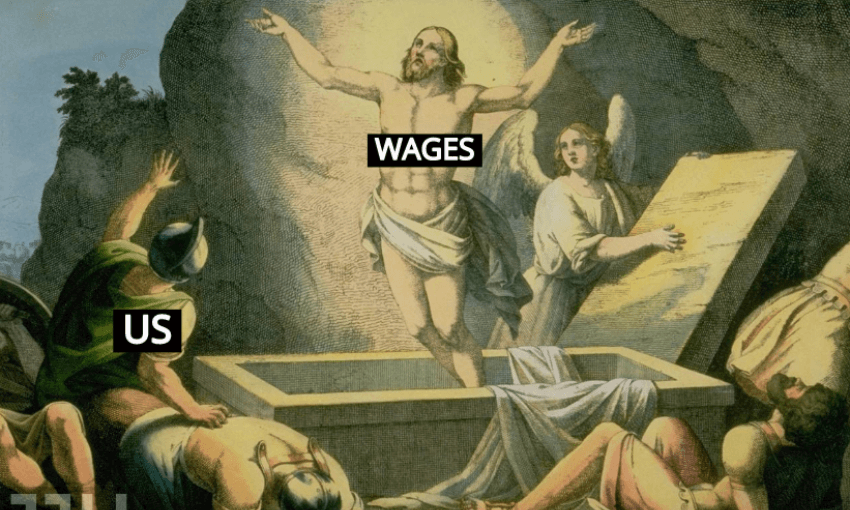After years of disappointing wage growth, and income growth more broadly, are the stars aligned for a lift?
We all know it. It’s the feeling of busting your gut day-in day-out to finally get to payday, only to feel when you wrest open that little payslip, defeated and a little deflated: I worked all those hours for that?
Low wages afflict our economy. New Zealand is a low-wage economy compared to 36 OECD countries, ranked 18th out of 36 when our currency’s buying power is considered. And the gap is meaty: 10 of these 36 countries have average wages that are 25% higher than our wages in New Zealand; three countries have wages that are 50% higher. Sob. And the Aussies, those bloody Aussies in the lucky country, earn on average 32% more than New Zealanders.
But are our grim pay days winding down? Kiwibank’s chief economist Jarrod Kerr certainly thinks so. Here’s three reasons why:
We’re growing
The Kiwi economy is actually doing quite well, and forecasts show an economy growing a little above trend into next year.
Potential growth is the theoretical “Goldilocks” rate of growth for our economy, and at around 2.75%, it’s not too hot, or cold, but about right. Growing a bit above the Goldilocks’ rate should mean we start scrambling for more resources, including labour, and ultimately generate a bit more inflation – hopefully in wages, Kerr says.
We’re getting stretched
This slightly above trend growth should lead to a slightly faster reduction in spare capacity, which in turn, means businesses are bumping up against capacity constraints, and the hunt for the right workers is proving difficult for some.
Attracting the right workers usually requires bigger dollar signs. And the global backdrop is conducive to strengthening price pressure for wages, with solid demand. The final missing piece of the economic puzzle, inflation, should be found in time, the Kiwibank economist says – and a bit more global inflation added to tighter labour markets should lead to a lift in wages. It’s only a matter of time, Kerr says.
“In our forecasting round, we found ourselves restricting our economic growth forecasts, because capacity constraints are evident today particularly in the labour-intensive industries of construction and tourism. Kiwibuild will add much activity to sectors of the economy already running at full pace. Overall, we expect the Kiwi labour market to continue to tighten for a few years to come.”
Kerr says the Reserve Bank of New Zealand (RBNZ) has done some interesting work on wage-price setting, and they’ve noticed firms have become more backward looking on inflation. “We once looked to the future and said inflation will be around 2.5%, so I’ll increase my worker’s wages by 3%. Today, we look at the last inflation print (a dismal 1.1%) and say, well, that’s not much of a bargaining chip.”
The minimum wage is going up
But things won’t stay that way forever, Kerr says, and “fundamental forces will force the hand of the employer soon enough”. A lift in minimum wages is a fire-starter for rising wages. Tight labour markets are the fuel.
“The unemployment rate is at a nine year low of 4.4%, and we’re likely to see a further fall towards 4% in time. Underlying wage growth should lift as the labour market is stretched, and in addition, significant hikes to the minimum wage (aimed at lifting it to $20/hr by April 2021) add between 0.2%-0.5% points to annual wage growth from the June quarter 2018.”
Why does it matter?
There’s no doubt a meaningful lift in wages is needed. Income growth over the last decade has been disappointing (to use a gentle euphemism), Kerr says, and many ratios to income, like house price-to-income, and debt-to-income, have worsened.
“Income growth solves a lot of economic problems, we just haven’t had enough. And the distribution of income, with widening inequality, is a serious issue for our generation. Why do you think people get mad a vote for people like Trump, or to leave the EU or anti-immigration in general? They vote because they believe they’re losing.”
Kerr says the lift in the minimum wage helps address this issue, but it’s not the answer, and we also need to invest in education, technology and infrastructure to better serve low income earners. “And perhaps we need to take a look at tax reform.”
So there are two sides to every story, but he says we must still be mindful of what we’re wishing for.
The potential downside
“Our business customers have raised two major concerns with hikes to the minimum wage coming: finding the right labour, and paying higher wages,” Kerr says. Uncertainty around the new coalition government is also a lingering worry for businesses, they fear more costs, and the expected rise in wages will eventually hinder employment growth.
“A higher cost base may force firms to substitute away from labour to capital, and if you are going to automate, rising labour costs will accelerate your decision. We’ve tried to take into account capacity constraints and the rising cost of doing business into our forecasts, and for this reason we see growth slowing into 2020 as a result. Slower growth should then contribute to a slight rise in the unemployment rate back to 4.4%.”
So while we need higher income growth Kerr says we also need to keep an open mind – and an open economy. “If we need construction workers and don’t have them, we should import them with temporary visas. Most are in agreement that we lack good infrastructure in parts, and affordable housing in most parts.”
The Spinoff’s business section is enabled by our friends at Kiwibank. Kiwibank backs small to medium businesses, social enterprises and Kiwis who innovate to make good things happen.
Check out how Kiwibank can help your business take the next step.
